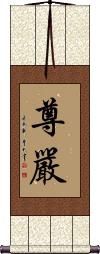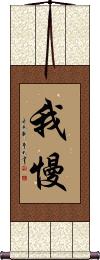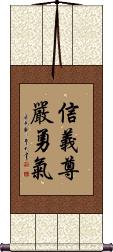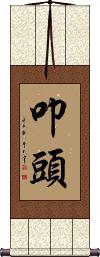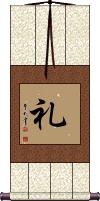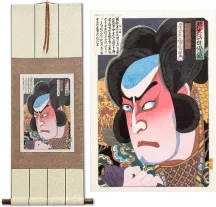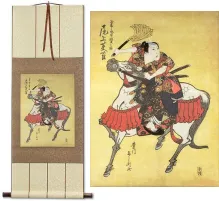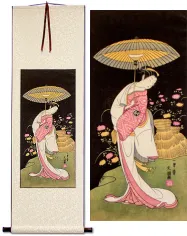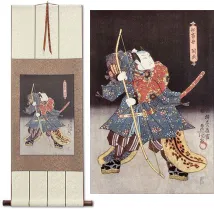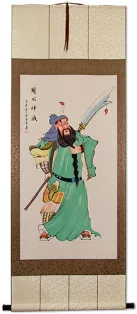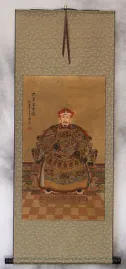Many custom options...
And formats...

Dignity in Chinese / Japanese...
Buy a Dignity calligraphy wall scroll here!
Personalize your custom “Dignity” project by clicking the button next to your favorite “Dignity” title below...
Dignity / Honor / Sanctity / Integrity
尊嚴 is a form of honor that means showing great respect for yourself, other people, and the rules you live by.
When you are honorable, you keep your word. You do the right thing regardless of what others are doing.
尊嚴 is the kind of personal honor or dignity that is of great value. If you lose this, you have lost yourself and perhaps the reputation of your family as well.
While this is not directly the same thing as “face” or “saving face” in Asian culture, it is associated with the same concept in China.
![]() In Japan, they currently use a more simplified second character for this word. The ancient Japanese form is the same as China but after WWII some Kanji were changed. If you want the modern Japanese version, just click on the Kanji image shown to the right, instead of the button above.
In Japan, they currently use a more simplified second character for this word. The ancient Japanese form is the same as China but after WWII some Kanji were changed. If you want the modern Japanese version, just click on the Kanji image shown to the right, instead of the button above.
Death with Dignity
Honor Courage
尊嚴勇氣 is a word list that means “Honor [and] Courage.”
Word lists are not common in Chinese, but we've put this one in the best order/context to make it as natural as possible.
We used the “honor” that leans toward the definition of dignity and integrity since that seemed like the best match for courage.
Gaman
Gaman is a Zen Buddhist term from Japan that means “enduring the seemingly unbearable with patience and dignity.”
This title can also be translated as patience, perseverance, tolerance, or self-denial.
我慢 is also a Chinese Buddhist term with a different pronunciation. It comes from Sanskrit abhimāna or ātma-mada. Chinese Buddhism defines this very differently as “Egoism exalting self and depreciating others,” “self-intoxication,” or “pride.” Alone, the first character means “Me, I, or Self,” and the second character in a Buddhist context comes from Sanskrit māna and means pride, arrogance, self-conceit, looking down on others, superciliousness, etc.
I’m currently working with Japanese and Chinese translators to try and reconcile the true meaning or any commonality of this word between languages. For now, please only consider this if your audience is Japanese.
Fidelity Honor Courage
信義尊嚴勇氣 means fidelity, honor, and courage in Chinese.
This is a word list that was requested by a customer. Word lists are not common in Chinese, but we've put this one in the best order/context to make it as natural as possible.
We used the “honor” that leans toward the definition of “dignity” since that seemed the best match for the other two words.
Please note: These are three two-character words. You should choose the single-column format when you get to the options when you order this selection. The two-column option would split one word or be arranged with four characters on one side and two on the other.
Kowtow - The deepest bow
叩頭 is the term that seems to be known worldwide as kowtow.
In Japanese and Chinese, it simply means a deep bow, especially one so low that one's head touches the ground in submission. However, in western culture, it has sometimes come to mean “giving in” or “surrendering to someone else's will.” Sometimes even said of a person who stoops to flattery at the expense of their dignity.
I don't know if you would really want this on a wall scroll, but enough people have searched for this term on our website that I guess it was time to add it. It just feels strange to see such a word on a wall scroll, so please order with caution. 叩頭 is antiquated in both Japanese and Chinese. The act is seldom done anymore and is seen as an ancient ritual.
Respect
Politeness, Gratitude and Propriety
礼 is one of the five tenets of Confucius.
Beyond respect, 礼 can also be translated as propriety, good manners, politeness, rite, worship, or an expression of gratitude.
We show respect by speaking and acting with courtesy. We treat others with dignity and honor the rules of our family, school, and nation. Respect yourself, and others will respect you.
 Please note that Japanese use this simplified 礼 version of the original 禮 character for respect. 礼 also happens to be the same simplification used in mainland China. While 禮 is the traditional and original version, 礼 has been used as a shorthand version for many centuries. Click on the big 禮 character to the right if you want the Traditional Chinese and older Japanese versions.
Please note that Japanese use this simplified 礼 version of the original 禮 character for respect. 礼 also happens to be the same simplification used in mainland China. While 禮 is the traditional and original version, 礼 has been used as a shorthand version for many centuries. Click on the big 禮 character to the right if you want the Traditional Chinese and older Japanese versions.
This is also a virtue of the Samurai Warrior
See our page with just Code of the Samurai / Bushido here
See Also: Confucius
This in-stock artwork might be what you are looking for, and ships right away...
Gallery Price: $108.00
Your Price: $59.88
Gallery Price: $99.00
Your Price: $54.88
Gallery Price: $200.00
Your Price: $66.88
Not the results for dignity that you were looking for?
Below are some entries from our dictionary that may match your dignity search...
| Characters If shown, 2nd row is Simp. Chinese |
Pronunciation Romanization |
Simple Dictionary Definition |
名誉 see styles |
meiyo / meyo めいよ |
More info & calligraphy: Honor |
尊嚴 尊严 see styles |
zūn yán zun1 yan2 tsun yen |
More info & calligraphy: Dignity / Honor / Sanctity / Integrity |
尊厳死 see styles |
songenshi そんげんし |
More info & calligraphy: Death with Dignity |
威 see styles |
wēi wei1 wei i い |
power; might; prestige power; authority; might; influence; dignity; majesty; (personal name) Tsuyoshi prabhāva. Awe-inspiring majesty; also 威力 and 威神力. |
容 see styles |
róng rong2 jung you / yo よう |
to hold; to contain; to allow; to tolerate; appearance; look; countenance (1) (archaism) countenance; visage; (2) face; honor (honour); dignity; (1) form; shape; figure; (2) visage; (surname, female given name) Yō Contain; bear; allow; bearing, face, looks; easy. |
顔 颜 see styles |
yán yan2 yen yan やん |
Japanese variant of 顏|颜[yan2] (out-dated or obsolete kana usage) (1) face; visage; (2) look; expression; countenance; (1) (archaism) countenance; visage; (2) face; honor (honour); dignity; (1) face; visage; (2) look; expression; countenance; (3) honor; honour; face; (4) influence; notoriety; (personal name) Yan face |
不屑 see styles |
bù xiè bu4 xie4 pu hsieh |
to disdain to do something; to think something not worth doing; to feel it beneath one's dignity |
人格 see styles |
rén gé ren2 ge2 jen ko jinkaku じんかく |
personality; integrity; dignity personality; character; individuality; personhood |
估券 see styles |
koken こけん |
(1) dignity; credit; public estimation; face; honor; reputation; (2) (archaism) deed of sale (for a land, forest or house); (3) (archaism) sale value; selling price |
体面 see styles |
taimen たいめん |
honour; honor; dignity; prestige; reputation; appearances |
値打 see styles |
neuchi ねうち |
(noun/participle) value; worth; price; dignity |
偉容 see styles |
iyou / iyo いよう |
dignity; majestic appearance |
品位 see styles |
pǐn wèi pin3 wei4 p`in wei pin wei hini ひんい |
rank; grade; quality; (aesomethingetic) taste (1) dignity; grace; nobility; (2) grade; quality; fineness; carat; karat rank |
品格 see styles |
pǐn gé pin3 ge2 p`in ko pin ko hinkaku ひんかく |
(of a person) moral character; integrity; (of a work of art or literature) style; character; quality; (music) fret (on a stringed instrument) dignity; quality; grace; panache; level |
善終 善终 see styles |
shàn zhōng shan4 zhong1 shan chung |
to die naturally with dignity; to pass away peacefully; (of partnerships, projects etc) to end well; to have a good ending |
喪盡 丧尽 see styles |
sàng jìn sang4 jin4 sang chin |
to completely lose (one's dignity, vitality etc) |
器量 see styles |
qì liàng qi4 liang4 ch`i liang chi liang kiryō きりょう |
tolerance (1) looks; features; personal beauty; (2) ability; talent; calibre; caliber; capability; capacity; (3) dignity; credit; estimation Capacity. |
威信 see styles |
wēi xìn wei1 xin4 wei hsin ishin いしん |
prestige; reputation; trust; credit with the people prestige; dignity; (personal name) Takemasa |
威儀 威仪 see styles |
wēi yí wei1 yi2 wei i igi いぎ |
majestic presence; awe-inspiring manner dignity; majesty; dignified manner Respect-inspiring deportment; dignity, i.e. in walking, standing, sitting, lying. There are said to be 3,000 and also 8,000 forms of such deportment. |
威厳 see styles |
igen いげん |
dignity; majesty; solemnity; gravity |
威嚴 威严 see styles |
wēi yán wei1 yan2 wei yen |
dignified; imposing; august; awe-inspiring; awe; prestige; dignity |
威容 see styles |
wēi róng wei1 rong2 wei jung i yō いよう |
grave and dignified dignity; majestic appearance dignified appearance |
威風 威风 see styles |
wēi fēng wei1 feng1 wei feng ifuu / ifu いふう |
awe-inspiring bearing; authority; power; imposing; impressive; majestic majesty; dignity; (female given name) Ikaze |
尊厳 see styles |
songen そんげん |
(noun or adjectival noun) dignity; majesty; sanctity |
廃る see styles |
sutaru すたる |
(v5r,vi) (1) (See 廃れる・すたれる) to go out of use; to become obsolete; to die out; to go out of fashion; (Godan verb with "ru" ending) (2) to become lost (e.g. of dignity); to be sullied |
扳回 see styles |
bān huí ban1 hui2 pan hui |
to pull back; to regain (one's dignity etc); to recover from (an adverse situation); to turn the tables |
挽尊 see styles |
wǎn zūn wan3 zun1 wan tsun |
(neologism) (slang) to salvage a bit of dignity (abbr. for 挽回尊嚴|挽回尊严[wan3 hui2 zun1 yan2]) |
有失 see styles |
yǒu shī you3 shi1 yu shih ushitsu |
to cause a loss of (decorum, dignity etc) (used in fixed expressions) having faults |
気品 see styles |
kihin きひん |
(1) elegance; refinement; grace; dignity; (2) aroma |
気韻 see styles |
kiin / kin きいん |
dignity; refinement |
Click here for more dignity results from our dictionary
The following table may be helpful for those studying Chinese or Japanese...
| Title | Characters | Romaji (Romanized Japanese) | Various forms of Romanized Chinese | |
| Dignity Honor Sanctity Integrity | 尊嚴 尊严 / 尊厳 | son gen / songen | zūn yán / zun1 yan2 / zun yan / zunyan | tsun yen / tsunyen |
| Death with Dignity | 尊厳死 | son gen shi songenshi | ||
| Honor Courage | 尊嚴勇氣 尊严勇气 | zūn yán yǒng qì zun1 yan2 yong3 qi4 zun yan yong qi zunyanyongqi | tsun yen yung ch`i tsunyenyungchi tsun yen yung chi |
|
| Gaman | 我慢 | ga man / gaman | wǒ màn / wo3 man4 / wo man / woman | |
| Fidelity Honor Courage | 信義尊嚴勇氣 信义尊严勇气 | xìn yì zūn yán yǒng qì xin4 yi4 zun1 yan2 yong3 qi4 xin yi zun yan yong qi xinyizunyanyongqi | hsin i tsun yen yung ch`i hsinitsunyenyungchi hsin i tsun yen yung chi |
|
| Kowtow - The deepest bow | 叩頭 叩头 | koutou / koto | kòu tóu / kou4 tou2 / kou tou / koutou | k`ou t`ou / koutou / kou tou |
| Respect | 禮 礼 | rei | lǐ / li3 / li | |
| In some entries above you will see that characters have different versions above and below a line. In these cases, the characters above the line are Traditional Chinese, while the ones below are Simplified Chinese. | ||||
Successful Chinese Character and Japanese Kanji calligraphy searches within the last few hours...
